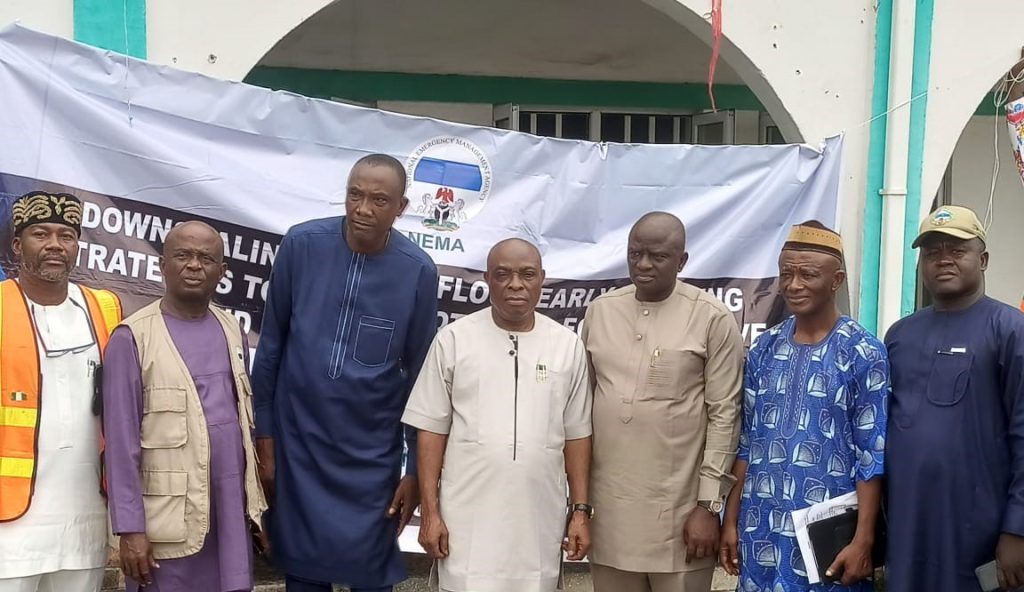Stephen Ukandu, Umuahia
In a bid to mitigate the impacts of flood disaster through proactive measures, the National Emergency Management Agency, NEMA, has commenced sensitisation of communities in Abia State on flood early warning strategies for early actions.
This is coming on the heels of earlier warning that 11 out of 17 Local Government Areas in Abia State, are on the high and moderate risk areas of flooding between July and September this year.
To that effect, NEMA organised a one-day sensitisation programme at the Michael Okpara Auditorium Umuahia, to educate stakeholders on early warning strategies.
The rainfall and flood advisories in the Seasonal Climate Prediction (SCP); and Annual Flood Outlook (AFO) of the Nigerian Meteorological Agency; and the Nigeria Hydrological Services Agency (NIHSA), respectively, had identified Abia as one of the risk states.
NIHSA had predicted in the 2024 AFO that 31 States with 148 Local Government Areas would witness high flood risk, while 35 States including FCT with 249 LGAs were considered to fall within the moderate flood risk areas.
The remaining 377 LGAs were forecast for the low flood risk areas, according to NIHSA.
Speaking during the sensitisation programme, Director General of NEMA, Zubaida Umar, said that the essence of the event was to arm the stakeholders with the necessary information to mitigate the impacts of the pending flood disaster.
The NEMA boss stressed that “management of disaster risk in contemporary times is everyone’s business,” and solicited the cooperation of communities.
He noted that the flood risk areas had already been presented with their degree of vulnerability “to serve as a tool for governments at all levels to develop risk reduction measures to avert disaster losses during this rainy season.”
Umar explained that the downscaling and sensitisation of the 2024 flood early warning strategies for effective early actions, was to save lives and livelihoods during the rainy season.
According to him, the devastating impacts of flood over the years especially that of 2012 and 2022 have served as a wake-up call to all tiers of Governments to collaborate with the NEMA, to manage disaster risks and associated hazards.
“In the recent past, lives have been lost, means of livelihood and infrastructure amounting to billions of Naira have been destroyed, due to unmitigated incidences of floods,” he lamented.
He, therefore, urged stakeholders to initiate without delay, actions that would help minimise the impacts of flooding especially on the poor folks.
“All of us are expected to take actions that will drastically reduce the adverse impacts of floods on the entire landscape and the Nigerian population, especially for the most vulnerable persons living in communities identified to be at risk of flooding.”
“To safeguard our assets and cultural heritage against the impact of this year floods, NEMA, after a two-day Stakeholders’ Technical Meeting in April and Emergency Coordination Forum in May, 2024, which analysed disaster risk management implications of the forecasts, designed and incorporated direct risk communication and engagement approaches to disseminate early warning messages for early actions at the state, local government and community levels.”
The NEMA boss, commended the efforts of Abia State Government towards reducing the risk of flooding, and called for more collaboration with other tiers of Government and stakeholders.
Declaring the event open, Gov. Alex Otti, noted that 11 out of 17 LGAs in Abia, had been predicted to be under high and moderate flood risk areas.
The Governor who was represented by the Commissioner for Environment, Mr Philemon Ogbonna, said that the essence of the sensitisation was to build citizens’ resilience and incorporate risk communication and engagement approaches to directly disseminate warning messages for early actions.
The Governor said that the exercise was in line with his vision to rebuild infrastructure in the state to help reduce the risk of flooding.
He called for synergy among all the necessary stakeholders including community leaders to help reduce the chances of flooding.

